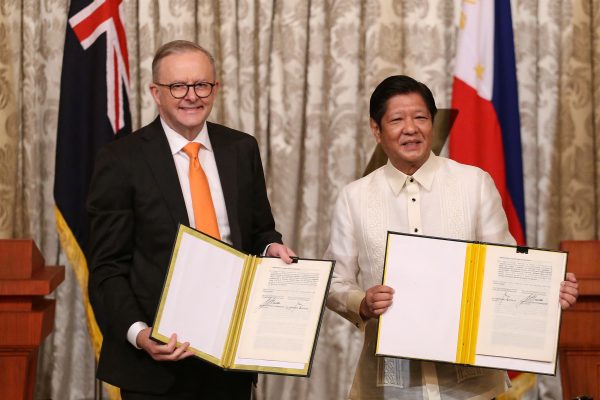Both maritime countries have been bound by shared values, mutual cooperation and strategic interest in a regional rules-based framework. As Asia’s oldest democracy, the Philippines shares a tradition of upholding democratic values and rights with Australia. But human rights violations during the Philippines’ martial law period in 1972–1986 prompted consecutive Australian governments to bring up their concerns with former Philippine president Ferdinand Marcos Sr.
Defence ties remained robust and have deepened in response to China’s rise, as exemplified by the 2012 Visiting Forces Agreement. But bilateral investment and trade, valued at AU$8.2 billion in 2022, is modest compared to Australia’s economic partnerships with other regional players like Indonesia, Vietnam or Thailand.
Coming on the heels of Philippine President Ferdinand Marcos Jr’s renewed engagement with traditional Western allies, the elevation from a comprehensive to strategic partnership signifies efforts to broaden current engagement. Such efforts align with Australia’s Southeast Asia Economic Strategy and new International Development Policy.
While security cooperation remains central, the expanded partnership has also identified agriculture, education, resources and the green energy transition as strategic sectors with significant potential. Initiatives such as reciprocal visa arrangements, doubling Australia Awards scholarships, enhancing agricultural research collaboration and establishing the Australian National University’s Philippines Institute all reflect this broader focus. There is also an emphasis on people-to-people ties, reflecting the growing importance of the Australian Filipino community — estimated at 400,000 in 2021.
There is much promise in this growing partnership, though several critical questions remain. Despite emphasising trade and investment, there is little consideration of the significant risk and governance challenges for investors in the Philippines. The Philippines ranks amongst the lowest-performing countries in the region on the Ease of Doing Business Index. It currently ranks 97 out of 140 countries on the World Justice Project Rule of Law Index, a considerable decline since 2015. The Philippines stands 116th out of 180 countries in the Transparency International Corruption Perception Index, one of the lowest rankings in Asia.
Addressing these governance concerns is of utmost importance for foreign investors. The Marcos Jr administration’s commitment to good governance and anti-corruption has largely remained rhetorical, with little concrete action.
Similarly, human rights concerns that gained prominence during former president Rodrigo Duterte’s War on Drugs, with an estimated 12,000 lives lost, have been largely sidelined. This is despite mounting evidence of continued drug-related executions, killings tied to counterinsurgency efforts and threats to journalists. The current administration has not only delayed the ongoing International Criminal Court investigation into past extrajudicial killings but has allowed the security apparatus to operate with relative impunity. This has made it challenging to achieve justice for victims.
Support for peace in Mindanao continues to face challenges due to an overly securitised approach. Joint military exercises on Philippine soil, as exemplified by the 2023 joint military exercise, establish trust between Australia’s and the Philippines’ armed forces. But these exercises are ill-equipped to address the evolving realities in Mindanao, which necessitate more inclusive approaches in community development, transitional justice and state-building.
It is imperative that both countries address the complex questions that arise in their relationship. This would mean Australia’s continuous support for critical oversight agencies. Given the considerable challenges in the Philippines’ justice sector, Australia’s commitment to supporting the reform initiatives of the Supreme Court of the Philippines is much-needed.
With the Comprehensive Agreement on Bangsamoro — the 2014 peace agreement signed between the Philippine government and the Moro Islamic Liberation Front — now being implemented, creative solutions are warranted to support state-building in Mindanao. This includes support for enhancing the capacity of key institutions such as Sharia District Courts, the Bangsamoro Human Rights Commission and various segments of civil society.
As Australia and the Philippines increase cooperation, there is considerable potential to move beyond mere geostrategic pragmatism. A genuine commitment to shared democratic values should be reflected in initiatives aimed at bolstering the rule of law, improving transitional justice, fostering transparency and helping marginalised populations participate in society. Recognising both countries have a legacy of historical injustices, there is an invaluable opportunity for mutual learning.
Australia’s aptitude in navigating its relationship with Indonesia serves as a reminder that it is possible to place shared interests at the core of a relationship, even in the presence of differences. The time has come not to shy away from these issues, but for Australia and the Philippines to translate shared commitments into tangible actions.
Björn Dressel is an Associate Professor at the Crawford School of Public Policy, The Australian National University, and the inaugural director of the ANU Philippines Institute.

